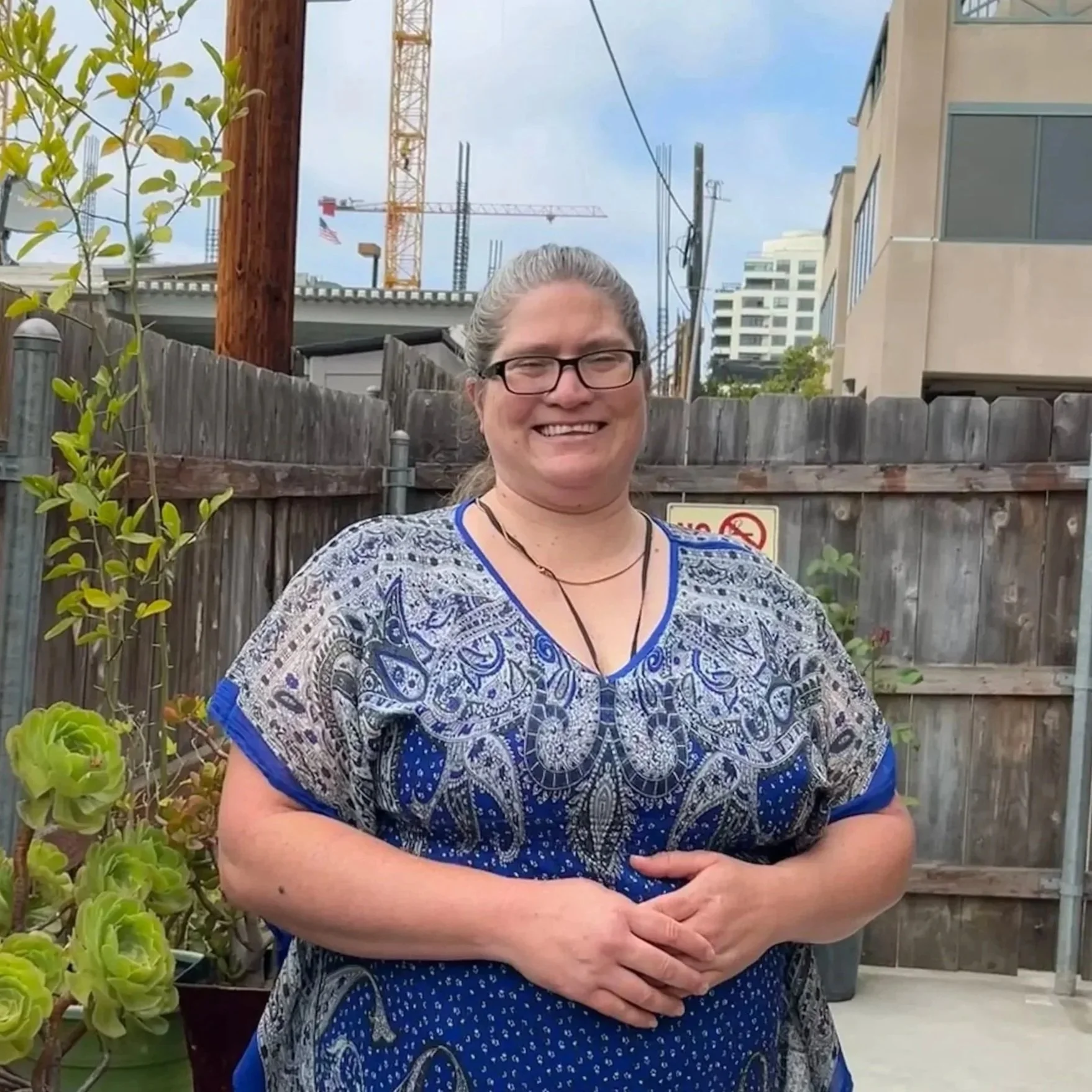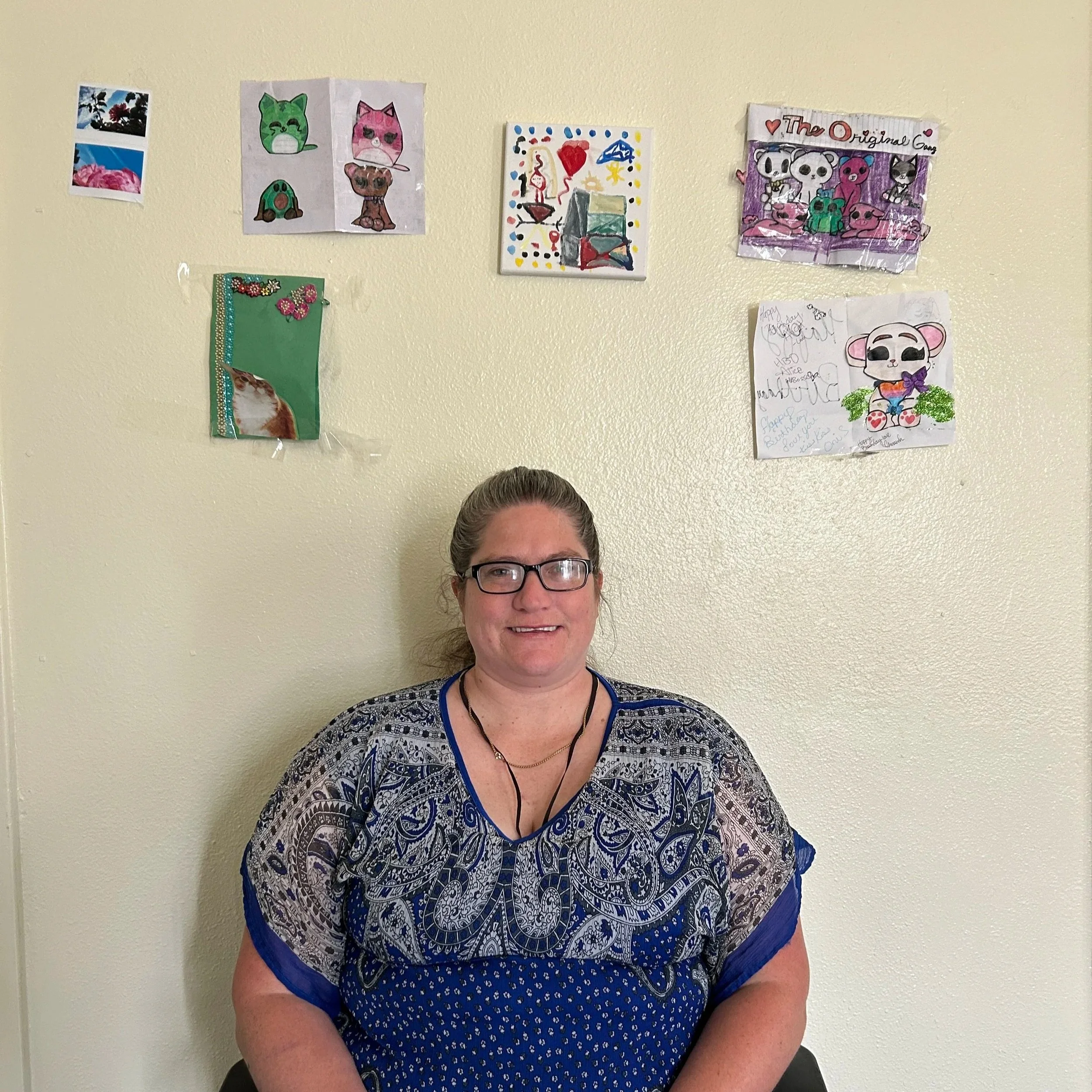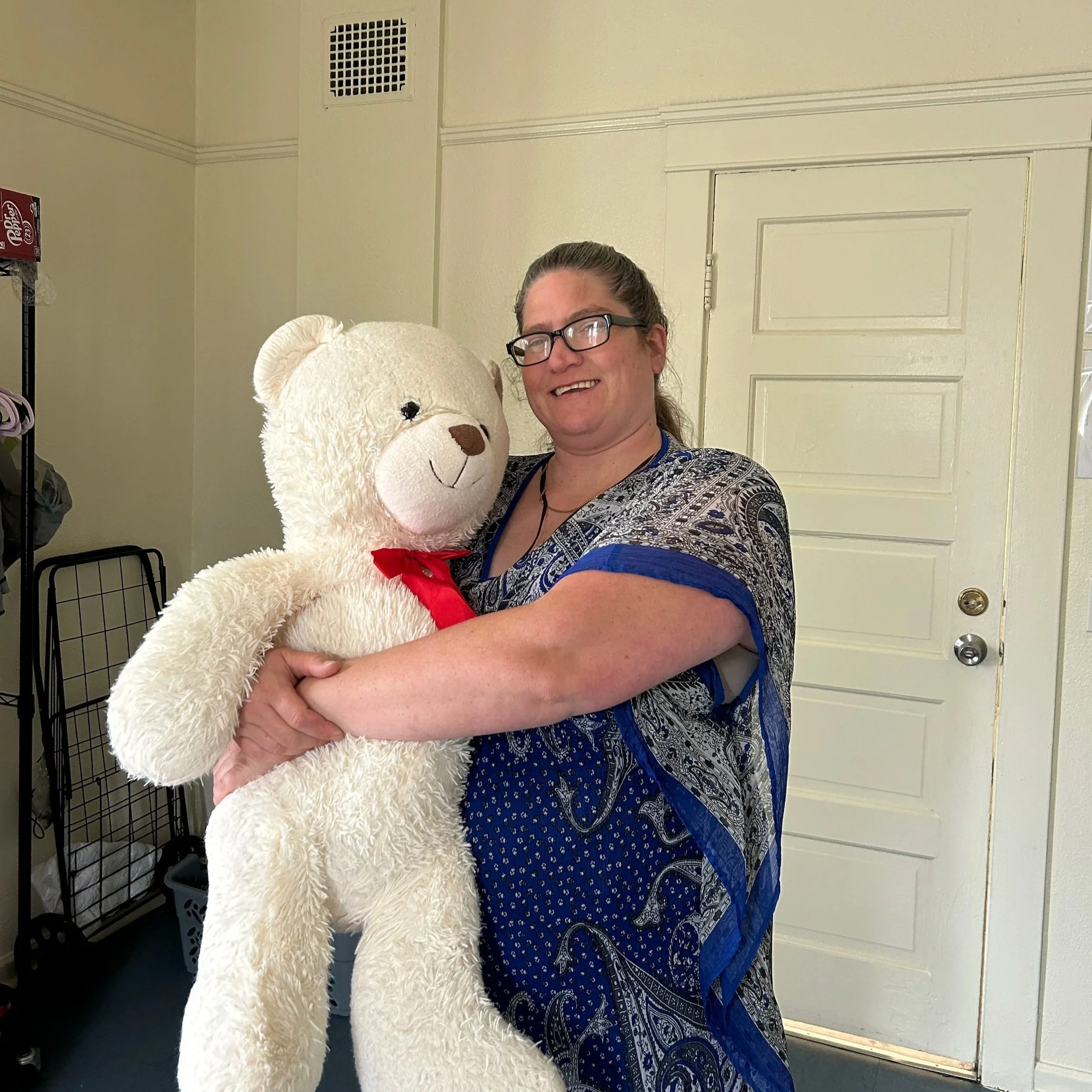Alice enjoys tending to the garden at UTSH. August 2025.
In the US, 21.1% of individuals experiencing homelessness also have a severe mental health condition. Serious mental illness (SMI) can majorly interfere with life activities and create unique obstacles for the people dealing with SMI. People like Alice.
Alice, a resident of Uptown Safe Haven (UTSH) since January, is known for her kindness, generosity, and dedication, but mental illness has created challenging obstacles along her path. “I am bipolar schizophrenic affected,” Alice said. About every two years, she has a severe mental breakdown. Alice has long followed this pattern of breakdown, to hospitalization, to stabilization, and eventually a return to her typical life routine — living at her parents’ house and working.
After nine years at the same job, Alice suffered a severe breakdown that resulted in six months of hospitalization followed by six months of care at a crisis house afterward. During her time at the hospital, Alice’s sister and brother-in-law convinced her parents to reject any attempt Alice made to return home. And, because she was under care for a year, her position at her job was no longer available upon her release. Alice was homeless with no one to turn to.
The crisis house could not keep Alice any longer, so they sent her out with nothing but the belongings she arrived with and a $5 bus pass.
Art gifted to Alice by friends hangs on the wall of her room at UTSH. August 2025.
Still, Alice was resourceful. After a difficult night spent sleeping on the trolley for safety, she took action. Alice was able to access her savings, acquire Social Security Disability Insurance (SSDI), and through those funds, complete her associate in accounting. Finally, her life was back on track. Until she was hit with yet another breakdown. “I'm good when I'm good and then I'm not when I'm not,” she said.
After that, Alice lost her SSDI and hopped from one job to the next between breakdowns. “I was so unstable,” she said. After a particularly bad breakdown, she returned to her parents’ house only to learn that her brother-in-law, in an effort to keep Alice and her breakdowns at bay, had obtained a restraining order against Alice with both of her parents listed on it. She violated the restraining order in a state of psychosis and promptly turned herself in.
After five challenging months in jail, Alice was released and placed in an independent living facility where she began psychiatric therapy. “I learned how to identify my mental illness, which is something I never knew before,” Alice said. “I learned how to calm it down; I learned how to overcome the mental illness.” Alice practiced techniques and found a better medication plan to help manage her symptoms. “I was impressed because everything was working. It wasn't panic attack, hospital, you know, it was panic attack, grounding techniques, medication, back on track,” she said. “It was a whole different path than what I was used to.”
While at the independent living facility, Alice got a new job. However, as her hours increased during the holiday rush, she was told she no longer qualified for free housing with that program, and the rent was more expensive than what she could afford. Just as she felt hope dissipating again, she learned about an opportunity to move to transitional housing at Uptown Safe Haven.
Life changed for Alice after moving to UTSH. She continued therapy, managing her mental illness more day by day, and participated in support groups led by Keith, an UTSH staff member. The staff offered her continuous support and kindness. “The staff is so nice to me. I mean they’re the best,” Alice said. “I realized that not all people are bad. There are people who are good, there are people who understand, there are people who work with you to make it better for you. And that's what I found here.”
Alice praises the compassion of the staff, but their admiration for her thoughtfulness shines just as bright. Alice frequently goes above and beyond her mandatory chores, ensuring that the facility is in perfect condition for her fellow residents and she volunteers with Voices of Our City Choir. But the kindness that Alice is perhaps best known for is her birthday cake tradition.
Alice keeps a box of cake mix in her room so she is prepared for upcoming celebrations. August 2025.
“When I was little, my birthday was overlooked a lot,” Alice explained. That lingering feeling pushed her to ensure no one at UTSH ever felt that way, so she started baking cakes for everyone’s birthdays, and even for some residents’ sobriety anniversaries. “I've done cakes for everybody... I think people like to be recognized and make sure everyone feels special.”
UTSH brought stability to Alice’s life. It also gave her a clean slate, helping to clear her criminal record. A few months ago, Alice went before a judge to address the charges on her record from violating the restraining order. During her court session, the judge pulled out a letter written by Raul, UTSH’s Program Manager, vouching for Alice’s character. “I feel compelled to write this letter to support Alice because she has been one of the most outstanding residents we've had during my time as program manager,” the letter read. “Her positive energy, reliability, and eagerness to grow makes her a valuable member of both our program and the broader community.”
“[The judge] asked me, ‘do you know what this letter says?’” Alice recalled. “I just nodded. I couldn't even speak. I was too busy crying. And she says, ‘this is the kind of letter that sways me.’ And she expunged my record.”
Through counseling, community activities, and pitching in with chores, Alice has prepared herself for independent living. Just a few weeks ago, Alice was approved for her own apartment. Her goal is to take that next step toward her future by living on her own and eventually using her degree to get a job as an accounting assistant or administrator.
UTSH helped Alice suppress her fears, regain her confidence, and prepare for independent living. August 2025.
Because of her mental illness, Alice used to live in constant fear. She had to pick herself up and start over all alone, time and time again. “But with the support that I have, especially from Uptown Safe Haven, it's really different,” Alice said. “If it wasn't for programs like this, I wouldn't have an opportunity to have my own place. And to actually be in an environment where you learn to live in your own place makes it so that you have a better outcome when you do get there.”
Alice expressed immense gratitude for the UTSH staff, ECS donors, Downtown Impact, San Diego Housing Commission, and God.
To learn more about the incredible work of UTSH, visit ECS Uptown Safe Haven.




